2020-12-11
Guitar Hero
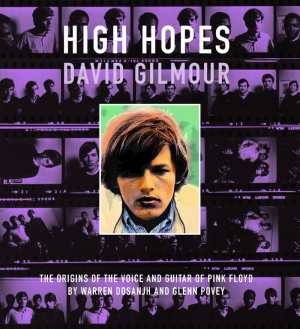
High Hopes
If you're planning to get a copy of High Hopes for Christmas, tough luck! This biography, limited to 500 copies, about the origins of the voice and guitar of Pink Floyd was sold out in a couple of weeks. If there will be no paperback (never say never) the Holy Church of Iggy the Inuit may be one of the scarce places where you can read about it.
We must disappoint those fans who are thinking that this is (yet, another) Syd Barrett biography. High Hopes is all about David Gilmour's Cambridge roots and one needs a magnifying glass to find anything about Syd, or Roger Waters, for that matter.
The reason is simple. David Gilmour took his musical road which was different than the routes followed by Syd Barrett and/or Roger Waters. It was only in December 1967 – January 1968 that their lines converged, making Pink Floyd a seventies prog-rock monster that has now become a world leader in rock recycling.
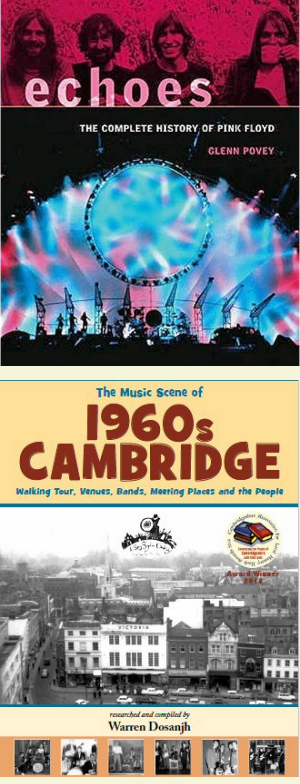
Glenn Povey
High Hopes has been written by two authors. Glenn Povey is probably well known as he has published several overlapping Floydian vade-mecums, including the quirky Pink Floyd in Objects. His Echoes chronology still is our main reference book when it comes to data confirmation.
Warren Dosanjh
Warren Dosanjh is less known, except when you are a Barrett anorak, a follower of the Holy Church, or an adept member of the Birdie Hop Facebook gang.
Somewhere hidden on this exceptional erudite blog is a 2011 interview with the man who claims to have been Syd Barrett's first manager, as noted down by Antonio Jesús from the slightly fantastic Spanish Syd Barrett blog Solo en las Nubes. You can read it at: Warren Dosanjh, Syd Barrett's first manager.
Dosanjh is also behind the I-spy-Syd-in-Cambridge website and the (free, downloadable) history book The music scene of 1960s Cambridge. It is recommended reading for people interested in the roots of Pink Floyd but is much more than that as it lists some of the competing sixties bands in Cambridge. And when you say bands in Cambridge in the sixties Syd Barrett invariably shows up and so does his buddy David Gilmour. (Roger Waters was more into booze and scooters than in music, apparently.)
Guitarist For Hire
Pink Floyd biographer Hugh Fielder, author of Behind The Wall, once confessed he was the singer in a Cantabrigian band called The Ramblin' Blues. One day, in 1965, they had a local gig planned but their guitarist couldn't make it. So they asked David Gilmour to step in and he blended in perfectly. There was only one small problem, Gilmour asked for the band's complete fee, so the other musicians had to play for free. Don't ask for a slice of my pie, he must have thought.
This anecdote, that isn't in High Hopes BTW, is representative for Gilmour's attitude towards his musical career, culminating in overpriced Pink Floyd boxes that invariably show up when Christmas is getting close. This doesn't take away that he is an exceptionally gifted musician though and it already showed in the sixties.
Libby Gausden, for instance, has testified several times that she and her friends liked Gilmour's band Jokers Wild much more than the somewhat bizarre Pink Floyd.
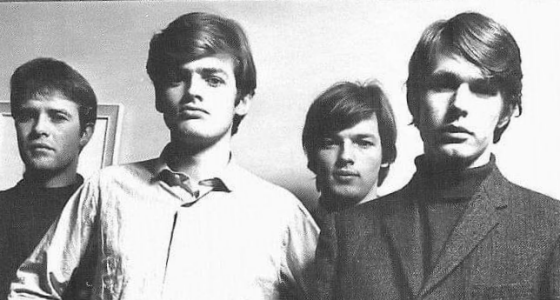
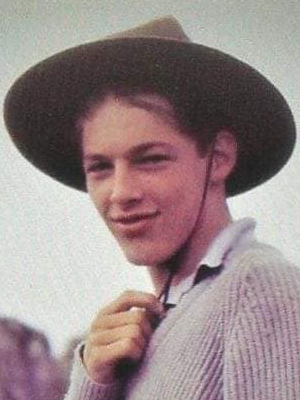
The Cambridge Mafia
High Hopes mixes Povey's encyclopedic Pink Floyd knowledge and Dosanjh's oral history notes and anecdotes from the Cambridge beatnik days. As such the book has quite some overlap with the 1960s Cambridge booklet and with those biographies that describe the Floyd's (and Barrett's) early days. If you are a close follower of the Facebook Barrett group Birdie Hop you may have seen the same people passing by: Viv Brans, Mick Brown, Libby Gausden, David Parker, Stephen Pyle… They like to talk about the sixties.
But what it does brilliantly is setting the record straight regarding the bands David Gilmour played in: The Newcomers (1963), The Ramblers (one gig, 1963), Jokers Wild (1964), Jokers Wild #2 (1966), Bullit (1966, same band), Flowers (1966, same band), Pink Floyd (1968).
Although there still is some uncertainty about how and when Bullitt and Flowers came into place.
Pictures
The real treat of this biography are the many pictures of Gilmour as a young man, coming from the family archives, that are slowly seeping through to the web: Gilmour as a toddler, Gilmour as a boy scout, Gilmour as a one-time photo model…
For aspirant record collectors there are pictures of the Jokers Wild EP (50 copies, taken from the Charles Beterams archives) and the Why Do Fools Fall In Love single (also 50 copies). Viv Brans' has got one of those, autographed by the band members, and it must be worth a small fortune.
When the authors could get hold of the archives of friends and family this biography is very detailed. There is a list of The Newcomers gigs with David Gilmour in the band. Same thing for the Jokers Wild gigs between February 1964 and May 1966, with ads for (some of) these shows and – in a few cases – even a set-list. En passant it is revealed that Peter Gilmour has some live recordings of the band, making fans drool all over the world.
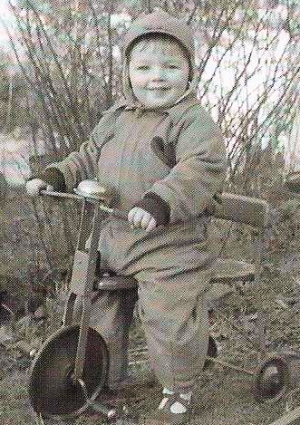
Sound Of Silence
David Gilmour did not help in the making of this biography. It shows in those parts where he is the only one who can illustrate certain facts. The chapter that deals with the recording of the A Coeur Joie soundtrack gets no further than what we already know.
Early in the book the 2015 BBC movie Wider Horizons is mentioned. Calling it a documentary is perhaps a bit too much honour as it was mainly a David Gilmour promotion film to accompany his Rattle That Lock album.
There is one highly personal moment though when the interviewer asks if Gilmour misses his mother. The answer is atypical, even for David: "Do I miss my mother? Mmm… no.", although - a few seconds before in the interview - he reveals that his mother's descend into dementia had triggered some emotions that came out in the form of a song (Wider Horizons).
Pink Orphans
Most Pink Floyd biographies compare the Roger Waters and Syd Barrett family relations as identical, as both musicians had lost their fathers. Roger Waters tried to ventilate his emotions by adding his father's story in The Wall and The Final Cut.
About Syd Barrett it has been suggested that his father's death may have triggered his downfall into drug abuse, ultimately frying his brains and becoming something of a slightly handicapped quixotic eccentric.
David Gilmour is mostly forgotten in this summary. The fact that his parents left their children, not once, not twice but three times in a row must have hurt him deeply. We know that Gilmour is a very stubborn man and that he will not easily change his point of view.
Jokers Wild #3
David Gilmour always liked to have his old Cambridge friends around (at least until Polly arrived, badmouths claim). For his first, eponymous solo album he invited his Jokers Wild #2 colleagues Ricky Wills and Willie Wilson. During one of the sessions at Gilmour's home studio, they were joined by David Parker (The Redcaps) and Clive Welham (Jokers Wild #1) and recorded the classic Peanuts, a 1957 hit by Little Joe & The Thrillers (and also covered by The Four Seasons).
When Clive Welham passed away in 2012 the song was published on YouTube and the fact that David Gilmour was playing on it was given away in the 2012 edition of The music scene of 1960s Cambridge, compiled by Warren Dosanjh. Nobody noticed and at the moment we write this review it has only been played about 1800 times in 8 years. (For comparison: Yes, We Have Ghosts has over two million hits.)
Perhaps someone should tell these all-knowing David Gilmour fans that their guitar hero is on this track. The biography High Hopes tries at least, but you need to have one of the 500 copies to know that.
Nice little biography, about a great musician who has been part of the greatest band in the world.
♥ Libby ♥ Iggy ♥
Sources (other than the above mentioned links):
Dosanjh, Warren &
Povey, Glenn: High Hopes, David Gilmour, Mind Head Publishing,
2020.
Dosanjh, Warren: The music scene of 1960s Cambridge,
Cambridge, 2015.
Fielder, Hugh: Behind The Wall, Librero,
Kerkdriel, 2014.
Povey, Glenn: Echoes, the complete history of
Pink Floyd, 3C Publishing, 2008.

